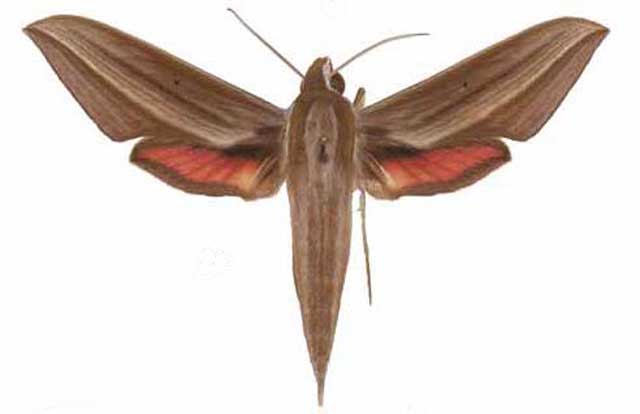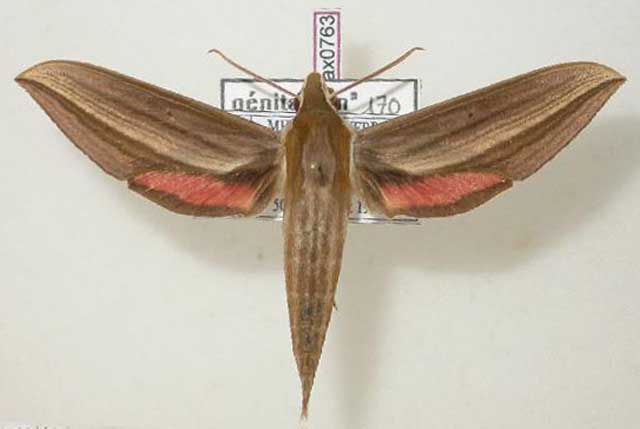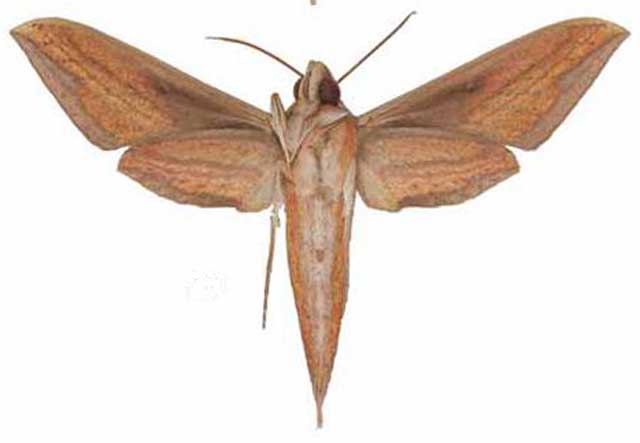Xylophanes balcazari
Updated as per Morphology and DNA barcoding reveal three cryptic species within the Xylophanes neoptolemus and loelia species-groups
(Lepidoptera: Sphingidae) THIERRY VAGLIA, JEAN HAXAIRE, IAN J. KITCHING, ISABELLE MEUSNIER & RODOLPHE ROUGERIE
Haxaire & Vaglia, 2008, Zootaxa 1923: 30.
Xylophanes balcazari
zail-AH-fan-eesMbal-KAH-zar-eye or
zye-LAH-fan-eesM bal-KAH-zar-eye
Haxaire & Vaglia, 2008

Xylophanes balcazari HT male, Guerrero, Mexico,
as per Zootaxa 1923: 30.
TAXONOMY:
Family: Sphingidae, Latreille, 1802
Subfamily: Macroglossinae, Harris, 1839
Tribe: Macroglossini, Harris, 1839
Genus: Xylophanes Hubner [1819] ...........
Species: balcazari Haxaire & Vaglia, 2008
|
DISTRIBUTION:
Xylophanes balcazari (wingspan: 70-73mm // forewing length: male mm) fly in
Mexico: Guerrero and Michoacan at elevations near 500m.
Guerrero: road from La Saltrera to Vallecitos de Zaragoza, km 45, 500m, 15.viii.1992.
This moth is very similar to X. neoptolemis and X. loelia.

Xylophanes balcazari, 70mm, Guerrero, Mexico,
courtesy of Jean Haxaire.
The species name "balcazari" is honourific for a man whose name is Balcazar, perhaps for Dr. Manuel Balcazar-Lara.
FLIGHT TIMES:
This species flies in August. Probably there are additional flight months.

Xylophanes balcazari HT male (verso), Guerrero, Mexico,
as per Zootaxa 1923: 30.
ECLOSION:
SCENTING AND MATING:
EGGS, LARVAE, PUPAE:
The pronunciation of scientific names is troublesome for many. The "suggestion" at the top of the page is merely a suggestion. It is based on
commonly accepted English pronunciation of Greek names and/or some fairly well accepted "rules" for latinized scientific names.
The suggested pronunciations, on this page and on other pages, are primarily put forward to assist those who hear with internal ears as they read.
There are many collectors from different countries whose intonations and accents would be different.
Jean Marie Cadiou writes, "When I say "Xylophanes" in English I pronounce it something like "Zailophanees", with the emphasis on the
"o". The French pronounce it differently, something like "Kzeelophaness" with no emphasis, and the Germans yet in a different way..."
In Greek myth, Phanes is the golden winged Primordial Being who was hatched from the shining Cosmic Egg that was the source of the
universe. He personifies light emerging from chaos.
"Xylo" is the Greek word for wood.
The specimen type for the genus Xylophanes is Xylophanes anubus. Perhaps ? when Hubner
examined that species, the yellow-orange and brown tones of the forewings suggested wings of wood.
This site has been created by Bill Oehlke. Comments, suggestions and/or additional information are welcomed by Bill.
Use your browser "Back" button to return to the previous page.
Goto Main Sphingidae Index
Goto Macroglossini Tribe
Goto Central American Indices
Goto Carribean Islands
Goto South American Indices
Goto U.S.A. tables


